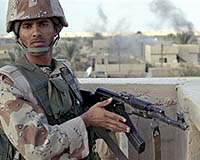| . |  |
. |
Baghdad (UPI) Jul 16, 2009 According to Iraqi officials, Prime Minister Nouri al-Maliki is making plans for his beleaguered government to wage a five-year war against al-Qaida jihadists and other insurgents as the United States withdraws its military forces. To do that would mean building up the Shiite-dominated government's intelligence capabilities. The problem is that the various security services established under the Americans' tutelage are wracked by sectarian rivalries and rampant corruption, with agendas that do not always follow that of the central government. This, along with a drastic drop in oil revenue because of lower prices, could derail the strategy ascribed to Maliki. A few weeks ago, as Maliki and his closest associates were mapping out their strategy, his interior minister, Jawad al-Bolani, called for a shift from military operations to a "war of intelligence" to crush the extremist groups that remain active following the U.S. "surge offensive" that was the Bush administration's last hurrah in Iraq. "I do believe that launching major military operations against al-Qaida is no longer needed and that there is a need to activate the intelligence side," he declared amid a renewed frenzy of suicide bombs in Baghdad and other cities. Maliki said in May that Iraqi forces were ready to take over the country's security but conceded that his government still needed a lot of help gathering intelligence to be able to hammer the insurgent groups. The plan, as it stands right now, calls for identifying and tracking al-Qaida units, Iranian-financed "Special Groups" of Shiite extremists and groups affiliated with Al-Awda, the successor to Saddam Hussein's now-outlawed Baath Party. The plan also calls for the formation of special forces to spearhead the counterinsurgency campaign. That should be the least of Maliki's problems. There are thousands of highly trained troops and paramilitaries available for that, and they've had a lot of combat experience over the last few years. But finding the funds for these operations may be more difficult for some time to come. To illustrate the chaos within the government as it supposedly prepares to launch its new plan, Gen. Talib al-Kenani, head of the Counter-Terrorist Agency supervised directly by the Cabinet, complained on June 19 that he'd had no formal budget since the Americans established the service in 2003. "We have nearly 10,000 agents, including women and all different religions and ethnicities, and we play a major role in the stabilization and improvement of the security situation," Kenani said. "But our biggest obstacle is that Parliament has still not adopted a government bill legalizing our existence and, therefore, we do not have a budget." For now, its funds are allocated directly from Maliki's office. In September 2007 Gen. David Petraeus, then the U.S. commander in Iraq, identified the flaws of the Iraqi departments most involved in the counterinsurgency effort, the Interior and National Security ministries, as one of the major failures of U.S. policy in Iraq. The head of the Security Ministry, Sheerwan al-Waeli, is a Shiite of Iranian origin who followed Tehran's line more than Washington's. He was at odds with the head of Iraq's National Intelligence Service, Gen. Mohammed Abdullah Shahwani, a Sunni and former officer in Saddam's army. That service was set up and funded by the Central Intelligence Agency after the March 2003 invasion and employed many veterans of Saddam's hated security services, erstwhile tormentors of the majority Shiites when the Sunni-led Baath ruled. In February 2008 Shahwani accused the Iranian intelligence services of working with Shiite politicians seeking to sabotage the largely Sunni tribal-based Awakening Councils the Americans had persuaded to quit the insurgency and fight al-Qaida. Maliki and his associates have never taken to the Awakening Councils, many of whose members were once allied with Saddam, or made any real effort to absorb them into the Shiite-dominated system as Washington sought to do to weaken the insurgency. In December 2008 the Interior Ministry, largely run by Maliki's Shiite rivals, launched a major crackdown inside Iraq's security apparatus. At least 23 officials of the ministry, including generals and colonels, were arrested on charges of affiliations with Al-Awda. The ministry denied there was any coup plot involved, but the arrests were widely seen as politically motivated to weaken Maliki's rivals before provincial elections held that month. Parliamentary elections are scheduled for January, so if the political backstabbing continues, Maliki's counterinsurgency plan, if such it is, faces serious obstacles -- from within. Share This Article With Planet Earth
Related Links Iraq: The first technology war of the 21st century
 Iraqi interpreters to sue Britain: BBC
Iraqi interpreters to sue Britain: BBCLondon (AFP) July 14, 2009 Some 25 Iraqis who worked for the British military are to take legal action against the government, saying they were not properly protected from extremists, the BBC reported Tuesday. The group, mainly interpreters, want compensation from British Prime Minister Gordon Brown's government because they claim they became targets for local militia who saw them as collaborators. "The Ministry ... read more |
|
| The content herein, unless otherwise known to be public domain, are Copyright 1995-2009 - SpaceDaily. AFP and UPI Wire Stories are copyright Agence France-Presse and United Press International. ESA Portal Reports are copyright European Space Agency. All NASA sourced material is public domain. Additional copyrights may apply in whole or part to other bona fide parties. Advertising does not imply endorsement,agreement or approval of any opinions, statements or information provided by SpaceDaily on any Web page published or hosted by SpaceDaily. Privacy Statement |